
Guests
- Paul FarmerU.N. Deputy Special Envoy for Haiti, under Special Envoy Bill Clinton. His new book, Haiti After the Earthquake, has just been published. Dr. Farmer is a medical anthropologist and physician. He is Kolokotrones University Professor at Harvard University and chair of the Department of Global Health and Social Medicine at Harvard Medical School. He is also founding director of Partners in Health.
Dr. Paul Farmer, who was worked in Haiti for nearly three decades and now serves as the the U.N. deputy special envoy for Haiti, discusses how U.S.-backed coups and neoliberal programs have not only subverted Haiti’s democracy, but also seriously weakened its public health. Dr. Farmer addresses the U.S. influence in Haiti in the context of recent WikiLeaks disclosures of classified U.S. diplomatic cables that documented the United States supported recent elections, despite the exclusion of Haiti’s most popular political group, the Famni Lavalas. The cables also documented that the United States advocated behind the scenes to block an effort to raise the minimum wage in Haiti. [includes rush transcript]
Transcript
AMY GOODMAN: So, as we go to—further in history, we talk about what happened two centuries ago, then the rise of democracy in Haiti with the first election of President Aristide. Talk about the effect—and you’re a doctor, you can also talk about the health effects—what happened—and you’ve written about this, as well—when Aristide was deposed the first time—he was ousted twice, in 1991 and 2004—and what it meant for this country, for the health of this country, ’91 to ’94, how many people died, and the politics of how this keeps happening.
DR. PAUL FARMER: Well, you know, many thousands of people surely lost their lives in that violent period between the coup in 1991 and the restoration of constitutional order. But I would say that that’s only a fraction of the cost and then a fraction of the cost in lives, because the chronic instability of Haiti is clearly related to our inability to build strong water systems, for example, to go back to cholera. These are causally related events. And so, the cost of these two coups against democratic process are greater than is appreciated, because they make it very difficult to govern or—I mean, that sounds like a very heavy-handed term, “make it difficult to govern.” What I mean is, things like roads and sewage and public schools and communications, all of these infrastructures do require some semblance of safety and security and order. We’ve had trouble in recent months delivering basic services because of instability, political instability, on the border with the Dominican Republic. This is on the Haitian side. So, I mean, I just—I would argue—to summarize, I would say that public health requires some semblance of social security and human security that you really don’t have when you’re having repeated coups and an inability to put in place governments. You can deliver medical services on a battlefield. You can transfuse blood and do surgery and do amputations. You can do it in the middle of an earthquake. But that’s not the same as building strong public health systems. That requires something else.
AMY GOODMAN: On page 28, I think, of your book, of Haiti After the Earthquake, you note that the coup of February 2004 further weakened the public health infrastructure, saying, quote, “Haiti’s president and his wife, the latter our staunchest advocate in the fight against AIDS, were spirited away to the Central African Republic in a way that resembled nothing so much as the 'extraordinary renditions' of suspected terrorists described in the popular press. Haiti’s elected government was replaced by a group of unelected officials (unelected by Haitians, in any case), and the Prime Minister was tossed in jail without charges. It was a dispiriting time, in large part because of the lies and distortions that figured prominently in many official policies, including some of my own country.” Can you talk about the U.S. role? I mean, it was the U.S. that put him on the plane that sent the Aristides off to the Central African Republic. They didn’t return until seven-and-a-half years later, just this—in these last few months.
DR. PAUL FARMER: Well, the U.S. role was central. And, you know, you reported on this from Central African Republic and elsewhere. For those of us in Haiti at the time, or in and around Haiti—I was not in Haiti on that day, I was actually seeing patients in Boston in the hospital—and, you know, it was like a slow-motion disaster unfolding over many months. And it was clear that this—I called it an aid embargo. And again, that’s disputed. You could call it whatever you want. It was an attempt to destabilize or undermine that government, which had been elected again. In fact, as I point out in this book, every time the Haitians have gone to vote in large numbers between the overthrow the dictatorship in 1986 and more recently, they’ve always voted for the same people. And I have to assume that they know what they’re doing. In fact, I also—I have a very healthy respect for the Haitians with whom I’ve been living and working, and I think it’s a big mistake for another government—I’m referring to my own—to undermine their ability to choose who they want as their leader. And even if I didn’t like the people they were electing, I would still think—you know, call me old-fashioned, but this idea of “one person, one vote” is a good one.
AMY GOODMAN: Well, let’s talk about this and the Lavalas, Fanmi Lavalas, Aristide’s party, being excluded. And you said, in March, Democracy Now! covered ousted Haitian president Jean-Bertrand Aristide when he returned to Haiti from South Africa, where he was in exile for more than seven years. We were on the plane when he landed in Port-au-Prince, and at the airport, he was greeted by thousands of supporters. He addressed the crowd in a number of languages. When he spoke in English, he said, “Exclusion is the problem, inclusion is the solution,” not directly referencing his party, Fanmi Lavalas, which was excluded from the election. But when he addressed the Haitians in Creole, in their language, he was much more explicit.
JEAN-BERTRAND ARISTIDE: [translated] You are right. If we don’t salvage our dignity, our dignity will be gone. Yes, you are right, because the problem is exclusion, and the solution is inclusion. The exclusion of Fanmi Lavalas is the exclusion of the majority. The exclusion of the majority means that you are cutting off exactly the branch that we are all sitting on. The problem is exclusion; the solution is inclusion of all Haitians without discrimination, because everybody is a person.
AMY GOODMAN: That was President Jean-Bertrand Aristide, March 18th, just a few months ago, on the tarmac at the airport in Port-au-Prince, saying that his party, the most popular party, was excluded from the elections. And then you have now the election of the new president, Martelly, under those conditions. What effect does that have on the people of Haiti?
DR. PAUL FARMER: Well, I mean, I just was reading that—that there is a—and I want to speak a little bit in sociological terms, if I can. I know that sounds typically professorial and like a cop-out. I don’t mean it that way at all. But just thinking about, again, public health, public health requires some degree, as I said, of stability. And there are various kinds of stability. I personally don’t believe the idea that, you know, you can oppress people or rule them from above. I don’t think, you know, it’s something that lasts or works. So that’s not really the kind of stability I’m talking about. I’m talking about the stability that comes from inclusion and participation. I think that’s a sound way to proceed. And I guess I’m saying that as just a human being, not so much as a physician.
The recovery of Haiti requires, as I said, a very substantial engagement from all Haitians, and inclusion. Otherwise, you have this chronic instability, and it’s very difficult to get things done. And I think that’s what, you know, Haiti is facing now, is very low levels of engagement from the population. As you know, very few people bothered to be involved in this last round of elections because of exclusion or the belief that their wishes weren’t going to be taken seriously anyway. And, you know, even watching from outside as a layperson who is not involved in politics directly, again, sociologically, I don’t think that’s a good way to proceed.
AMY GOODMAN: I mean, it doesn’t sound like apathy at all, having been there and spoken with many people, as well. And as you probably have found, people were angry. They were angry they didn’t feel represented. So, that brings us to WikiLeaks. I just came back from London, where I was moderating a discussion with Julian Assange, the founder of WikiLeaks. But there is this trove of WikiLeaks documents that relate to Haiti. And Kim Ives of Haïti Liberté and Dan Coughlin of the—who has been writing for The Nation, have been analyzing these WikiLeaks documents around Haiti. And I wanted to go to the one around the elections. The WikiLeaks released 2,000 classified U.S. diplomatic cables on Haiti. The Haitian—and The Nation and Liberté have been publishing them. One cable shows how the United States, the European Union and the United Nations supported Haiti’s recent presidential and parliamentary elections despite concerns over the exclusion of Haiti’s largest party, Fanmi Lavalas, the party of Aristide. So this is Dan Coughlin, co-author of The Nation report, on Democracy Now! just a few weeks ago.
DAN COUGHLIN: What these cables show, Amy, is really remarkable. It’s like the curtain being pulled from behind the Wizard of Oz, a really inside look at what the U.S. policy is in Haiti, the materially poorest country in the Western hemisphere. So they’re blocking a preferential trade deal with Venezuela that means huge stability for the Haitian people, stable electricity supply, $100 million in extra funding for the government, which they use for social programs.
We see the manipulation, extraordinary manipulation, of Haiti’s presidential election, where, quote-unquote, the international community recognizes that the opposition is “emasculated.” So why are we bothering to have an election, if the most popular political party has been banned? And you see in these cables, the Canadians and others are like a little concerned. Hey, how are we going to have an election here? And literally, the head of the E.U. in Haiti—
AMY GOODMAN: European Union.
DAN COUGHLIN: —the head of the U.N., the head of—the Spanish ambassador, the Brazilian ambassador, the U.S. ambassador, at a meeting, at a table, discussing this. And finally, they decide, “Oh, we have too much invested in Haiti not to let these fraudulent elections move forward.”
AMY GOODMAN: That was Dan Coughlin, who was writing about these in The Nation magazine. Why did the U.N., the United States, our country, the E.U., the European Union, insist on these elections being held? When the largest—it’s just like saying, the Republicans are not allowed to be represented in the next election, or the Democrats are not allowed. That’s the equivalent in Haiti—actually more, because they have even more support.
DR. PAUL FARMER: I don’t know. I mean, I have been, I could say, lucky enough to have a different brief, you know, which is healthcare, and I can only speculate. Again, looking back at this Cold War mentality that clearly governed—I say “clearly,” this is also a hypothesis on my part. I didn’t interview the people who were the architects of some of these policies ever. In fact, I’ve not even met them. But I think, in the 19th century, as I said, the big issue was slavery. Later on in the 19th century, it was gunboat diplomacy and control of the customs houses, the economy. When we invaded Haiti in 1950 and stayed for 20 years, one American president said, really, this is the—it’s really about not so much about diminishing German influence in Haiti, which was one of the absurd claims from that era, but from really controlling the economy. And then came the Cold War. And some of the people—not to, again, reach too far back, some of the people involved in setting Haiti policy, for example, between 2000 and 2004, '05, ’06, the period that you covered, some of it sounds like Cold War thinking to me: these people keep on electing these left-wing nuts, and we won't have it. And whereas when I’m living and working there, what I hear is people, not as left-wing or right-wing or—it’s really who’s going to side with the poor majority? And again, I think it’s their business to choose the leadership that they want.
AMY GOODMAN: And I should have asked, what effect does this have when you disempower the people? And you can talk as a doctor and as a person who’s lived and worked in Haiti for years.
DR. PAUL FARMER: Well, I can just tell you that the last—we’ve gotten a lot done as an organization, I think, with our Haitian sister organization. Just, we work with thousands. We’ve gotten a lot done. But the key to unlocking real dramatic improvements in public health and public education, at the very least—I mean, what I’m leaving aside, of course, is agriculture, tourism, private-sector development, just because I don’t know as much about those. But I’m convinced that the only way to really see public health and public education blossom in Haiti is allowing full participation of the majority. So, to me, those are, again, causally related.
AMY GOODMAN: We’re going to break and then come back. Dr. Paul Farmer has written a new book; it’s called Haiti After the Earthquake. He is co-founder of Partners in Health, which works in Haiti and many other countries. He has in fact just returned from Rwanda. We’ll be back with him in a minute.

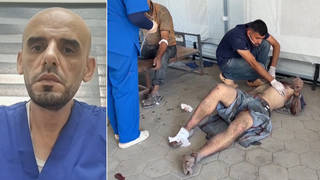
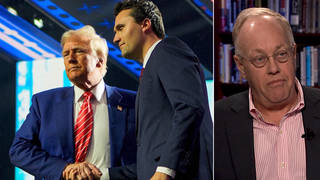
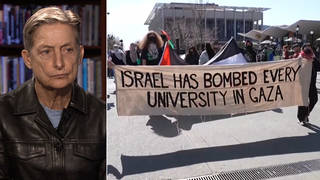





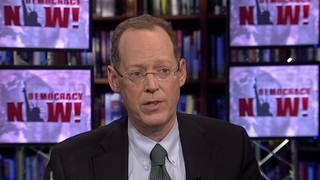
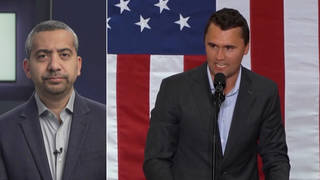
Media Options